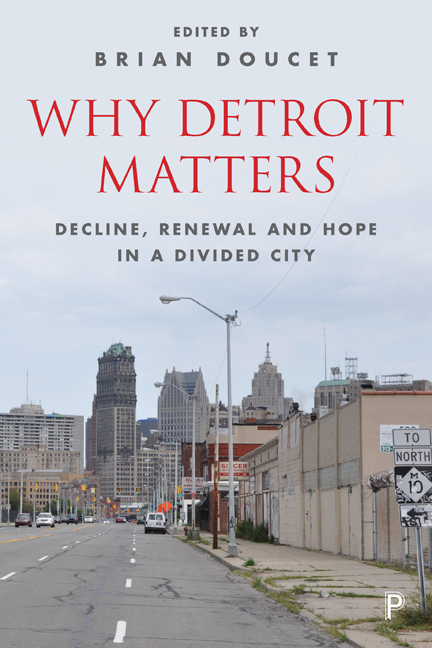Book contents
- Frontmatter
- Contents
- List of contributors
- List of figures and tables
- Acknowledgments
- one Introduction: why Detroit matters
- Section One Lessons from Detroit
- Intermezzo I You may not know my Detroit
- Section Two Practices from Detroit
- Intermezzo II My Detroit
- Section Three Conversations from Detroit
- References
- Index
seven - Preserving Detroit by preserving its baseball history
Published online by Cambridge University Press: 05 April 2022
- Frontmatter
- Contents
- List of contributors
- List of figures and tables
- Acknowledgments
- one Introduction: why Detroit matters
- Section One Lessons from Detroit
- Intermezzo I You may not know my Detroit
- Section Two Practices from Detroit
- Intermezzo II My Detroit
- Section Three Conversations from Detroit
- References
- Index
Summary
More than one third of the land in Detroit is vacant. For some people, driving past the corner of Michigan and Trumbull, just west of Downtown, means passing by one of countless abandoned lots. However, to millions of others, this particular space is special. As Jason Roche argues, many consider it to be sacred ground. For more than 100 years, Michigan and Trumbull was home to professional baseball in Detroit. It was the home of the Detroit Tigers from 1912 until September 1999. After that, Tiger Stadium lay empty for 10 years until it was finally demolished in 2009. Remarkably, the dirt in the infield—and even anchor for home plate—remained in place (the Tigers moved the actual home plate to their new Downtown home at Comerica Park).
A year later, a small group of baseball enthusiasts—many of whom had worked tirelessly over the previous decades to try to preserve Tiger Stadium—started removing debris and cutting the weeds that had grown over the grass to more than two meters in height. They considered the site to be special and wanted to make the field playable once again. The site is owned by the City of Detroit and the group, named the Navin Field Grounds Crew (after the initial name of the stadium), initially got into trouble with the police for trespassing. Although the threat of arrest subsided, as Downtown Detroit's “renaissance” has grown, so too has the interest in redeveloping this site, which is very close to downtown. While a big box retail development envisioned by many municipal leaders never materialized, the land is now in the hands of the Detroit Police Athletic League (PAL) and a developer, who will turn it into a mixed-use development (including the new headquarters for the PAL), with an artificial turf field for youth sports.
The story of the Navin Field Grounds Crew highlights several important threads of this book; as Kimberley Kinder also showed in Chapter Six, it focuses on the grassroots initiatives of “do-it-yourself urbanism,” and Roche vividly details the efforts of the Grounds Crew to restore and maintain a site that they have no formal ownership of, nor legal claim to.
- Type
- Chapter
- Information
- Why Detroit MattersDecline, Renewal and Hope in a Divided City, pp. 135 - 156Publisher: Bristol University PressPrint publication year: 2017



